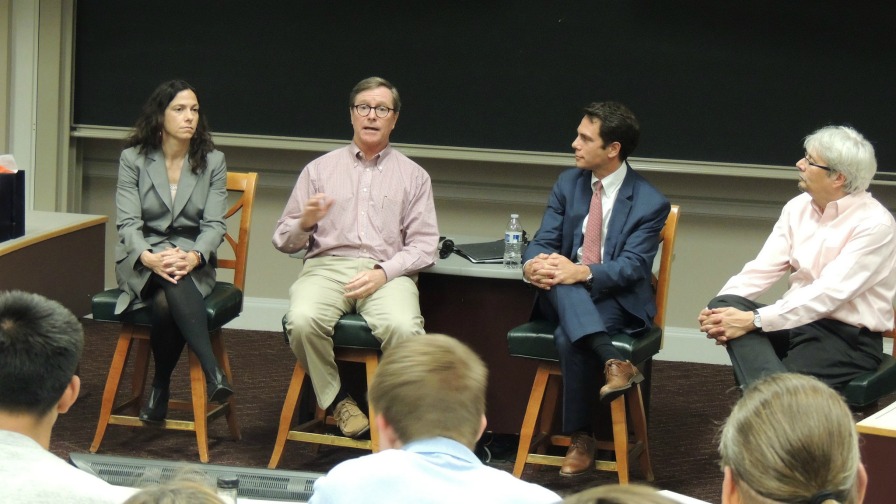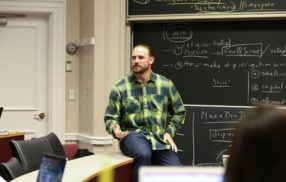
Experts Examine Flint Water Tragedy, US Infrastructure Crisis
By Dave Hendrick
Virginia Tech Professor Amy Pruden said she was “just an everyday professor doing my thing” in Blacksburg, Virginia, before she, her colleague and Virginia Tech students began investigating toxic tap water in Flint, Michigan.
The results of the wide-ranging investigation showed elevated levels of lead and the bacteria that causes Legionnaires’ disease throughout the city, findings that brought international attention to both the impoverished city and the state of America’s water infrastructure — and eventually brought multiple criminal charges to a number of public officials.
Pruden spoke at the University of Virginia Darden School of Business at the final session of UVA’s World Water Events, an event presented in collaboration with Darden’s Institute for Business in Society and Net Impact Club and hosted by Darden Professor Peter Debaere. Pruden joined McWane Inc. President G. Ruffner Page Jr. (MBA ’86) and UVA School of Law Professor Cale Jaffe in a wide-ranging discussion on water and its impact on public health.
Although the experts dissected the issue from their unique vantage point, they were united in their lowly assessment of the state of America’s water infrastructure and current regulatory system, as well as the difficult path toward a sustainable solution.
“Public health is an essential aspect of sustainability,” Pruden said. “You can’t have sustainability without protecting public health.”
Pruden described the nightmare scenario that played out in Flint, in which the move to a less costly source of water caused elevated levels of lead to leach out of aging pipes and sparked a Legionnaires’ outbreak that killed 12 people and sickened dozens.
In addition to shining a bright light on the short sightedness of putting cost savings over sustainable solutions, Pruden said the events should serve as a wakeup call for how unprepared the country is to face water-borne threats.
“If we can’t get it right with lead, what hope do we have for emerging concerns, let alone sustainability?” Pruden said.
Page, president of an industrial multinational that produces multiple products used in the transmission of water from source to home, said the officials involved in Flint failed to take into account “lead-leaching prevention 101” by not considering the impact of the shift in the water chemistry and its effects on lead pipes.
“It’s positively horrific what happened up there,” Page said, calling the scandal a clear failure of management.
Page discussed his experience working in Washington, D.C., and the limits of state-revolving funds, a state-level mechanism for funding water infrastructure.
Compared to the large sums that are regularly earmarked for highway improvements, Page said water draws a pittance, with funds recently increased to $4 billion for the entire United States.
Page further said water projects are rarely among the highly touted “shovel-ready” stimulus projects, as the unseen nature of the issue rarely drives votes.
Beyond safety concerns are economic ones. Page said 30 percent of the water pumped in the United States is lost via leakage in route to its final destination, a sum even starker when considering that 10–12 percent of electricity used in the country is for pumping water.
In addition to advocating for increases in water infrastructure funding, Page said McWane was working on a number of products that would make determining water quality easier and more readily available, such as Wi-Fi-connected in-home water monitoring.
While such technology can play a role, Page said the public would be best served by greater recognition of the enormous deficiencies in the country’s water supply, and the costly efforts needed to fix them.
“If it’s underground or unseen and you’re not personally affected by it or it doesn’t affect someone you know, a lot of our elected officials don’t necessarily focus on it,” Page said. “We need to make sure that the awareness is there and that there is an appreciation for the impact from a health standpoint, from an environmental standpoint and from an economic cost to our society.”
Jaffe, the director of the environmental and regulatory law clinic at the UVA School of Law, discussed the legal tools available to citizens or groups interested in claiming violations of the Safe Drinking Water Act, and the general difficulty of mounting successful citizen suits in a timely manner.
Even in the case of Flint, which drew widespread national outrage, it took more than a year for a judge to deliver a preliminary injunction ordering bottled water to all Flint homes, Jaffe said.
The UVA professor, who formerly served as director of the Virginia branch of the Southern Environmental Law Center, said the reaction to scandals like Flint can sometime be colored by political allegiances, with one side arguing that the scandal demonstrates the chronic underfunding of public servants and another drawing the lesson that large federal bureaucracies cannot be trusted.
“Whatever the solution is, we’ve got to think about it and communicate about it in a way that addresses both of these narratives,” Jaffe said. “Everyone agrees there’s a problem.”
The panel capped the fourth year of World Water Week at UVA, a collaborative venture that includes events at UVA’s School of Engineering and Applied Science, School of Architecture, College of Arts and Science and Batten School of Leadership and Public Policy.
Net Impact Week Events
The water panel capped a busy week of Darden events sponsored by the Net Impact Club and a variety of clubs and institutes across Grounds. The Net Impact Week events included separate panels on impact investing and entrepreneurship in Rust Belt cities and a cold call event pertaining to the global refugee crisis, among other sessions.
At the keynote address, Rebecca Van Bergen, the founder of Nest, a nonprofit dedicated to advancing the interests of global artisans and home workers, described the her company’s journey to becoming a significant player in the global clothing supply chain. The work, which seeks to bring the “informal, invisible and unregulated” work of artisans out of the shadows and into a safer and more lucrative setting, currently involves about 400 artisan businesses operating across 50 countries and multiple partnerships with brands such as West Elm and Patagonia.
Van Bergen, who spoke of the enormous sums that would be added to the global economy if the contributions of home-based workers were formalized, said she hoped to deepen her organization’s connection to Darden via internships, potential global courses and future case studies with Darden students and faculty.
The University of Virginia Darden School of Business prepares responsible global leaders through unparalleled transformational learning experiences. Darden’s graduate degree programs (MBA, MSBA and Ph.D.) and Executive Education & Lifelong Learning programs offered by the Darden School Foundation set the stage for a lifetime of career advancement and impact. Darden’s top-ranked faculty, renowned for teaching excellence, inspires and shapes modern business leadership worldwide through research, thought leadership and business publishing. Darden has Grounds in Charlottesville, Virginia, and the Washington, D.C., area and a global community that includes 18,000 alumni in 90 countries. Darden was established in 1955 at the University of Virginia, a top public university founded by Thomas Jefferson in 1819 in Charlottesville, Virginia.
Press Contact
Molly Mitchell
Senior Associate Director, Editorial and Media Relations
Darden School of Business
University of Virginia
MitchellM@darden.virginia.edu






